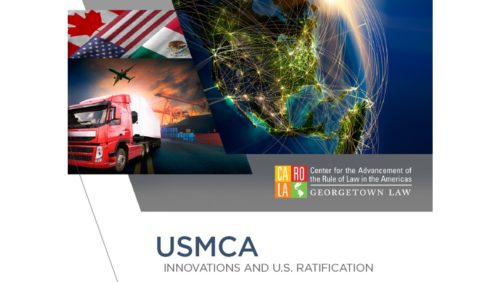USMCA: Innovations and U.S. Ratification
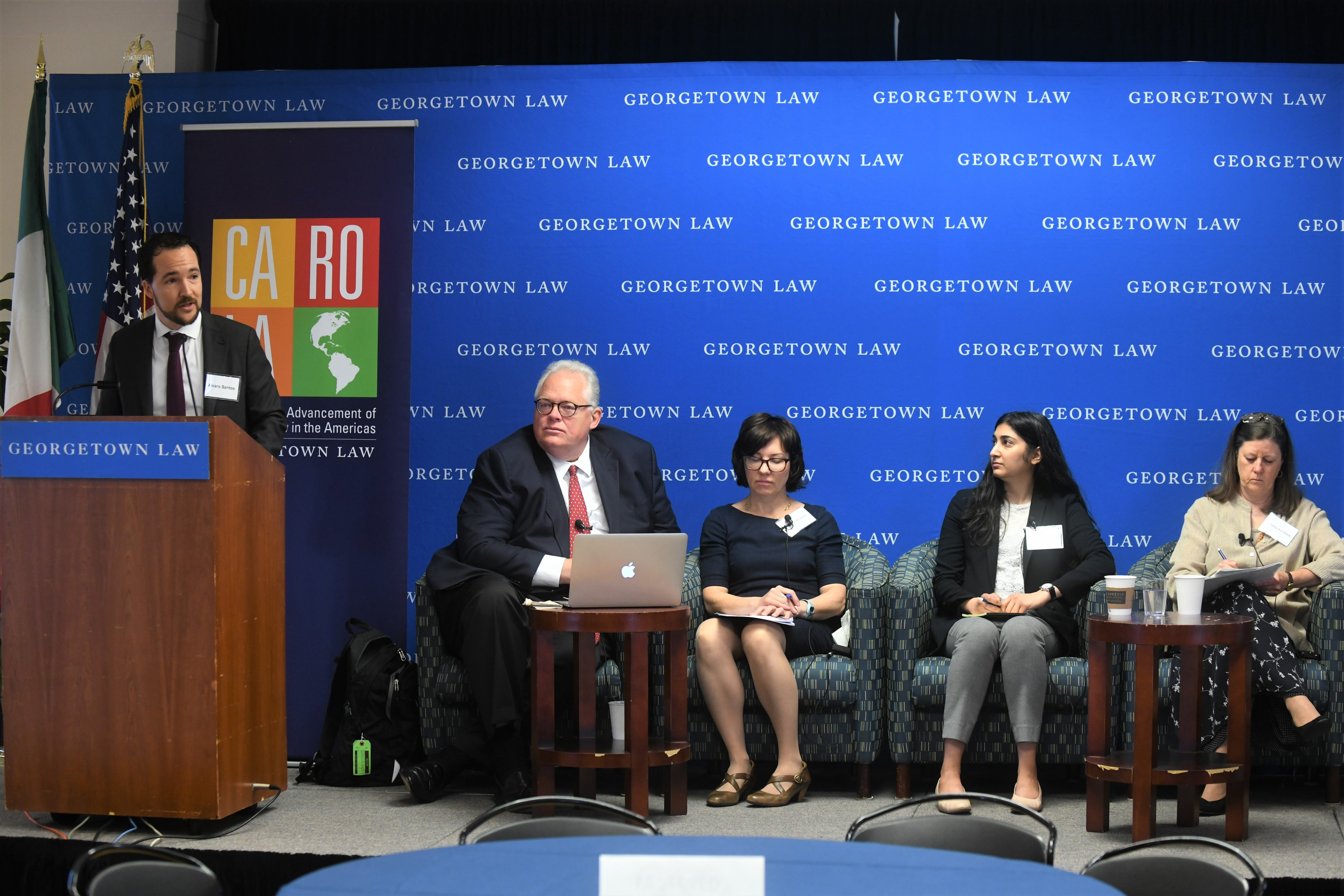 On Monday, April 22nd, 2019, Georgetown Law’s Center for the Advancement of the Rule of Law in the Americas (CAROLA) hosted the conference “USMCA: Innovations and U.S. Ratification” to examine the changes to NAFTA that resulted from the new U.S., Mexico, and Canada trade agreement (USMCA) and discuss potential solutions to the hurdles of its ratification. The conference was organized around two panels and included a keynote delivered by Her Excellency Martha Bárcena, Ambassador of Mexico to the United States.
On Monday, April 22nd, 2019, Georgetown Law’s Center for the Advancement of the Rule of Law in the Americas (CAROLA) hosted the conference “USMCA: Innovations and U.S. Ratification” to examine the changes to NAFTA that resulted from the new U.S., Mexico, and Canada trade agreement (USMCA) and discuss potential solutions to the hurdles of its ratification. The conference was organized around two panels and included a keynote delivered by Her Excellency Martha Bárcena, Ambassador of Mexico to the United States.
Click here to see the conference program
Summary of Discussions
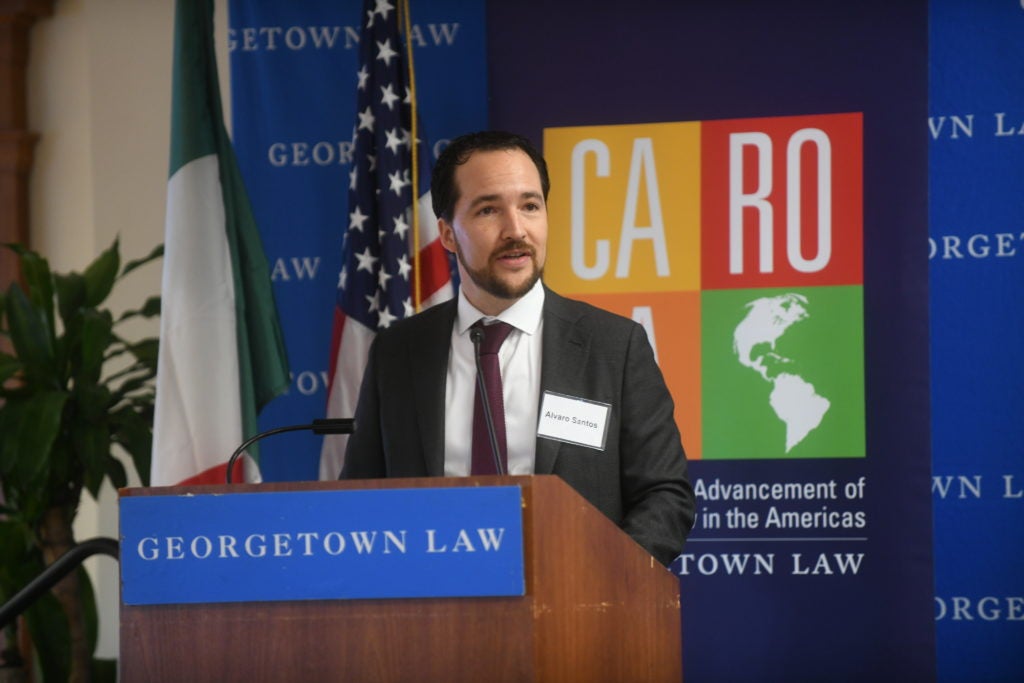 Professor Alvaro Santos, Faculty Director of CAROLA, opened the conference by providing a blueprint of the panels that were to follow. Panel 1, titled “Is USMCA a new path for trade agreements?” was put together to understand if and how the USMCA sets the course for new trade relations in the North American region. Does the USMCA signal a new direction for U.S. trade agreements? Do the changes from NAFTA to USMCA respond to the recent globalization backlash? These were the questions that animated the first panel. Panel 2, as its title “USMCA ratification in the U.S.” suggests, dealt with the concerns the have been recently raised by the Democratic members of Congress around the USMCA and how they might be address through the process of ratification. Can those concerns be taken care of in the implementing legislation to the agreement? What are the lessons to be drawn from previous U.S. trade ratification processes, in particular that of the NAFTA? These were some of the questions that framed the discussion for the second panel.
Professor Alvaro Santos, Faculty Director of CAROLA, opened the conference by providing a blueprint of the panels that were to follow. Panel 1, titled “Is USMCA a new path for trade agreements?” was put together to understand if and how the USMCA sets the course for new trade relations in the North American region. Does the USMCA signal a new direction for U.S. trade agreements? Do the changes from NAFTA to USMCA respond to the recent globalization backlash? These were the questions that animated the first panel. Panel 2, as its title “USMCA ratification in the U.S.” suggests, dealt with the concerns the have been recently raised by the Democratic members of Congress around the USMCA and how they might be address through the process of ratification. Can those concerns be taken care of in the implementing legislation to the agreement? What are the lessons to be drawn from previous U.S. trade ratification processes, in particular that of the NAFTA? These were some of the questions that framed the discussion for the second panel.
Both panels were organized so as to encourage analysis based on years of experience and research while also fostering the exchange of views with a plural set of perspectives and with both sides of the political spectrum in mind. Panelists came from nongovernmental organizations, think tanks, unions, and firms, and many had held positions in the government in the past. Panel 1 was chaired by Grant Aldonas, Executive Director of Georgetown Law’s Institute of International Economic Law, and was composed by Christine McDaniel, Senior Research Fellow at the Mercatus Center of George Mason University, Kimberly Ann Elliott, Visiting Fellow at the Center for Global Development, Ben Beachy, Director of A Living Economy at Sierra Club, and Inu Manak, Visiting Fellow at the Cato Institute. Panel 2 was presided over by Jennifer Hillman, Professor from Practice at Georgetown Law, and consisted of Celeste Drake, Trade and Globalization Policy Specialist at AFL-CIO, Stephen J. Claeys, Partner at Wiley Rein, Brian A. Pomper, Partner at Akin Gump, and Elizabeth Baltzan, Principal at American Phoenix Trade Advisory Services PLLC.
I his welcoming remarks, Professor Santos situated the conference in the context of CAROLA’s work, in particular our Future of NAFTA and North American Economic Integration Conference, the Rethinking Trade and Investment Law Workshop and Book Project and our Globalization Backlash Student Writing Competition. Quoting Albert Hirschman’s book, “The Passions and the Interests: Political Arguments for Capitalism before Its Triumph,” Professor Santos also reminded the audience that trade can be a force for prosperity, but that all hopes for peaceful progress and democratic governance cannot be pinned on trade. The U.S. cannot expect that the rules of trade, such as those contained in the USMCA, provide “the main solution to the distributional concerns in its society.” Mexico also cannot expect that the USMCA be “its solution to growth and development necessary to lift half its population out of poverty.” The U.S., Mexico, and Canada need to think beyond the USMCA and cooperate on many other fronts in order to appease the passions “of nationalism, xenophobia and resentment that can pit our societies against each other.” He concluded that USMCA could be a “renewed opportunity for engagement between the North American partners, to establish a solid economic basis to be sure, but also to think ambitiously and creatively on how to cooperate for a prosperous future.”
Panel 1 – Is USMCA a new path for trade agreements?
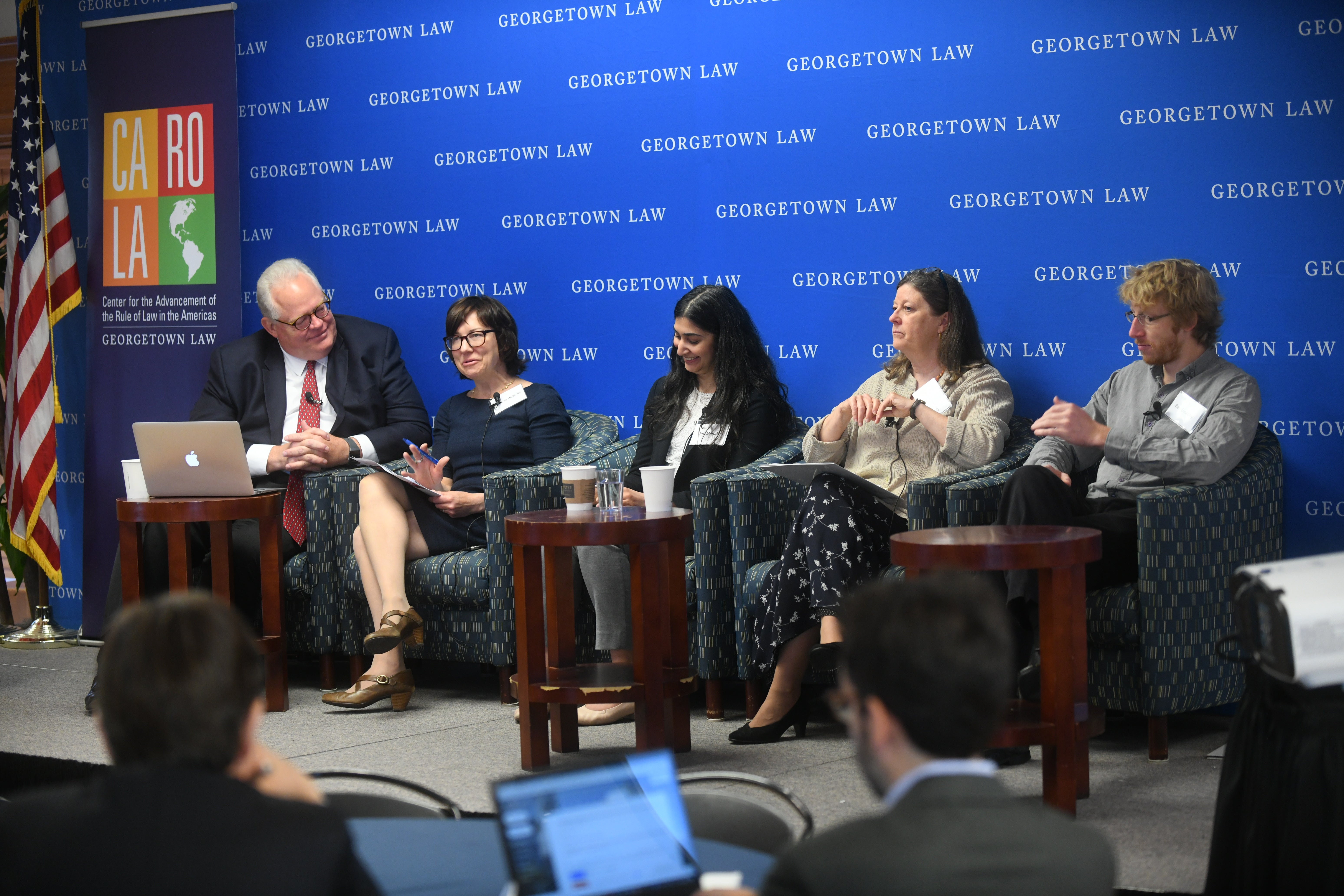 Grant Aldonas kicked off the first panel by asking the panelists to comment on whether the USMCA typified a model for the future and the extent to which it represented a significant departure from NAFTA. Kimberly Ann Elliott opined that seen in isolation, the NAFTA and USMCA were indeed different agreements, but that mindful of the evolution of U.S. trade agreements as a whole over the last 25 years, the change could be characterized as incremental at most, the USMCA building from the same basic model and being –save for certain innovations in auto rules of origin, investment, and labor- very similar to the Trans-Pacific Partnership Agreement (TPP). What was different, according to Mrs. Elliot, was the politics around USMCA (how we got here), inasmuch as the U.S. would not have had a renegotiated NAFTA if Trump had not withdrawn from the TPP. In terms of the economics, Christine McDaniel remarked that the USMCA was on the whole a positive, adding however that trade agreements are oversold –U.S. International Trade Commission (ITC) reports have almost always attributed small but positive effects to them- and they cannot solve all of the domestic problems of the domestic economy. In referring to an aspect of the USMCA that might serve as a model for other agreements moving forward, Mrs. McDaniel singled out digital trade as a discipline in which American “strength shines through.”
Grant Aldonas kicked off the first panel by asking the panelists to comment on whether the USMCA typified a model for the future and the extent to which it represented a significant departure from NAFTA. Kimberly Ann Elliott opined that seen in isolation, the NAFTA and USMCA were indeed different agreements, but that mindful of the evolution of U.S. trade agreements as a whole over the last 25 years, the change could be characterized as incremental at most, the USMCA building from the same basic model and being –save for certain innovations in auto rules of origin, investment, and labor- very similar to the Trans-Pacific Partnership Agreement (TPP). What was different, according to Mrs. Elliot, was the politics around USMCA (how we got here), inasmuch as the U.S. would not have had a renegotiated NAFTA if Trump had not withdrawn from the TPP. In terms of the economics, Christine McDaniel remarked that the USMCA was on the whole a positive, adding however that trade agreements are oversold –U.S. International Trade Commission (ITC) reports have almost always attributed small but positive effects to them- and they cannot solve all of the domestic problems of the domestic economy. In referring to an aspect of the USMCA that might serve as a model for other agreements moving forward, Mrs. McDaniel singled out digital trade as a discipline in which American “strength shines through.”
Sierra Club’s Ben Beachy intervened to say that the USMCA did not significantly depart from the status quo in terms of the environment. Gauging the importance of environmental issues in U.S. trade deals from the number of pages dedicated to it in the recent ITC report –1.5 out of over 300 pages- and the fact that there is no reference to climate change in the USMCA (and all previous trade agreements), Mr. Beachy posited that these issues did not register as a priority, even though the concern with environmental arbitrage is real. According to him, deals that incentivize the free flow of goods but that do not impose the same standards on all parties in areas such as labor and the environment, encourage arbitrage and the shifting of production where the standards (and costs) are the lowest. In short, they are instruments for corporations to undercut labor and environmental regulations and for the outsourcing of pollution and jobs.
Changing gears to speak of investor-state dispute settlement (ISDS), Christine McDaniel put forward the argument that the mechanism helps fill an institutional and rule-of-law gap, and that not having that mechanism in the USMCA sets a precedent. Picking up on that idea, however, Inu Manak observed how the scaling-back of ISDS (although timid as the USMCA grandfathers in certain sectors) puts the United States back on par with the rest of the world, and that the decoupling of investment from trade is a trend that will continue in other trade agreements. Removing ISDS puts the onus on countries to develop a sound rule of law and a system of effective courts to improve the investment climate, which should, according to Mrs. Manak, be the way for managing investment rules moving forward. Echoing this argument, Ben Beachy also commented that the current ISDS model provides a ceiling not a floor for government action in the public interest. There are other instruments for providing a floor of certitude for investment, of which, according to the World Bank’s Doing Business Report, ISDS is not a principle one.
Panel 2 – USMCA ratification in the U.S.
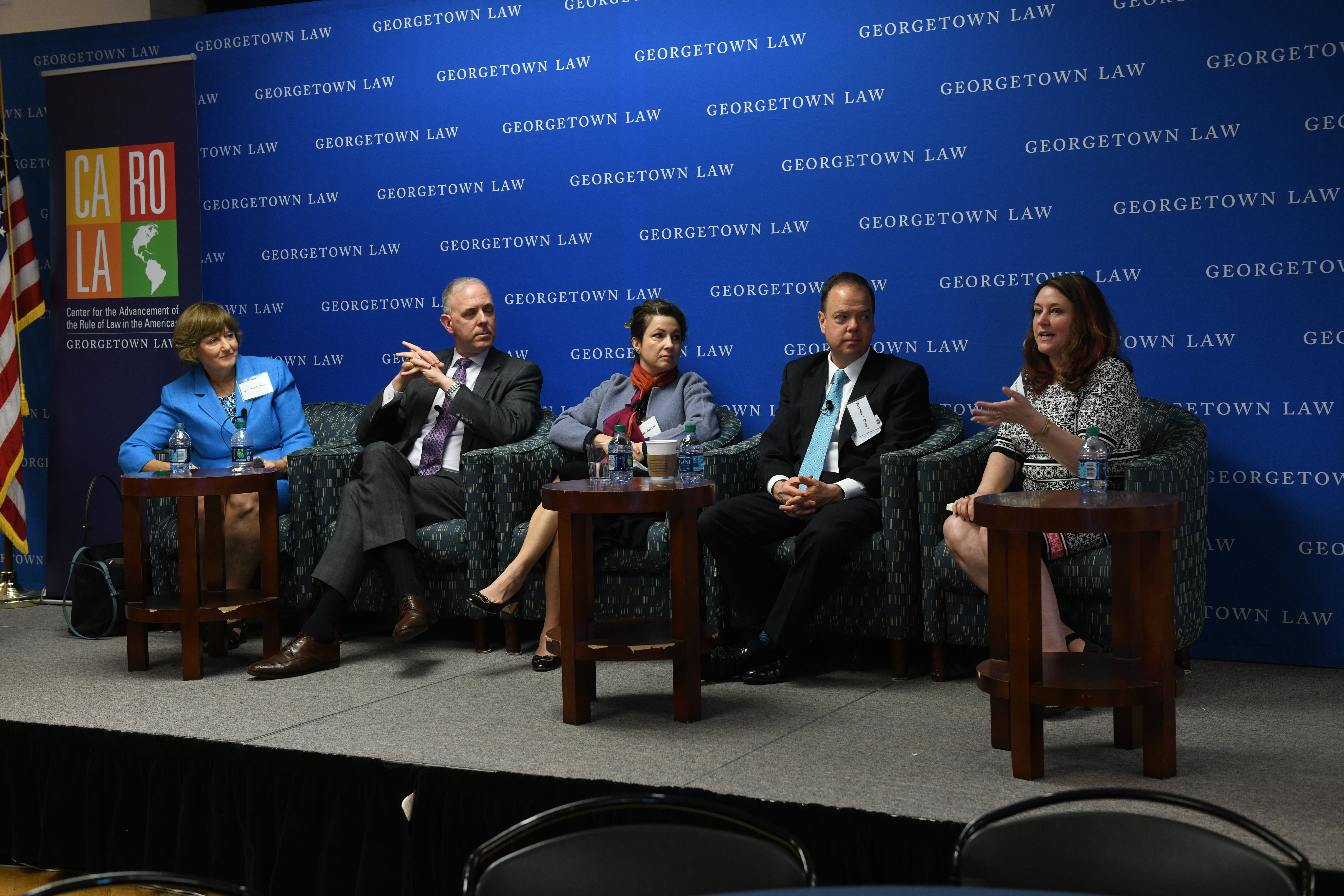 Georgetown Law’s Jennifer Hillman got the second conversation underway by asking for comments on what needed to be done going forward to get the USMCA through. Stephen Claeys began by briefly identifying the legal steps that would have to be followed by the Executive in order to get the USMCA bill passed, highlighting however, that the more interesting aspects moving forward concerned the policy issues that would need to be worked out with Congress in order to get the votes needed to ratify the agreement: labor, environmental, and intellectual property provisions with the Democrats and steel and aluminum tariffs with the Republicans. Elizabeth Baltzan then jumped in to mention that the new standard under the Trade Promotion Act for adding to a trade agreement via the implementing legislation was “strictly necessary and appropriate,” and that as a result it would be very hard to include a wish list of policy issues within the implementation bill.
Georgetown Law’s Jennifer Hillman got the second conversation underway by asking for comments on what needed to be done going forward to get the USMCA through. Stephen Claeys began by briefly identifying the legal steps that would have to be followed by the Executive in order to get the USMCA bill passed, highlighting however, that the more interesting aspects moving forward concerned the policy issues that would need to be worked out with Congress in order to get the votes needed to ratify the agreement: labor, environmental, and intellectual property provisions with the Democrats and steel and aluminum tariffs with the Republicans. Elizabeth Baltzan then jumped in to mention that the new standard under the Trade Promotion Act for adding to a trade agreement via the implementing legislation was “strictly necessary and appropriate,” and that as a result it would be very hard to include a wish list of policy issues within the implementation bill.
Brian Pomper then took the floor to say that the political battle would take place principally within the House of Representatives, while also pointing out that for the Democrats, the current president/administration might be far from the ideal counterpart from whom to extract trade concessions or with whom to have a broader conversation about trade. Stephen Claeys agreed, putting across the notion that Trump may believe he has already conceded enough by having the negotiations in the first place, and that he might not be very willing to “pay” any further to get the USMCA through Congress.
Shifting the discussion to consider the objectives of the USMCA, Celeste Drake reflected on whether one of the goals of the agreement should be to bring back jobs from Mexico. Mrs. Drake considered that bringing back jobs was not one of the aims of a trade agreement and USMA would not meet that goal. She argued that trade agreements have never done enough for those at the bottom, including workers. The current trade model assumes that winners compensate the losers, but in the United States that has never really happened. Trade deals might “grow the pie” but are also known to have exacerbated inequality. In order to offset those tendencies, domestic legislation that compensates the losers should be introduced in tandem. And, according to Mrs. Drake, the reason this has yet to happen is because the powers behind the current trade model are opposed to such reforms.
Before closing the panel, Professor Hillman asked the panelists to weigh in on the odds that the USMCA would be passed this calendar year. The panelists expressed little optimism. The chances that the agreement be ratified this year were low according to all participants.
Keynote
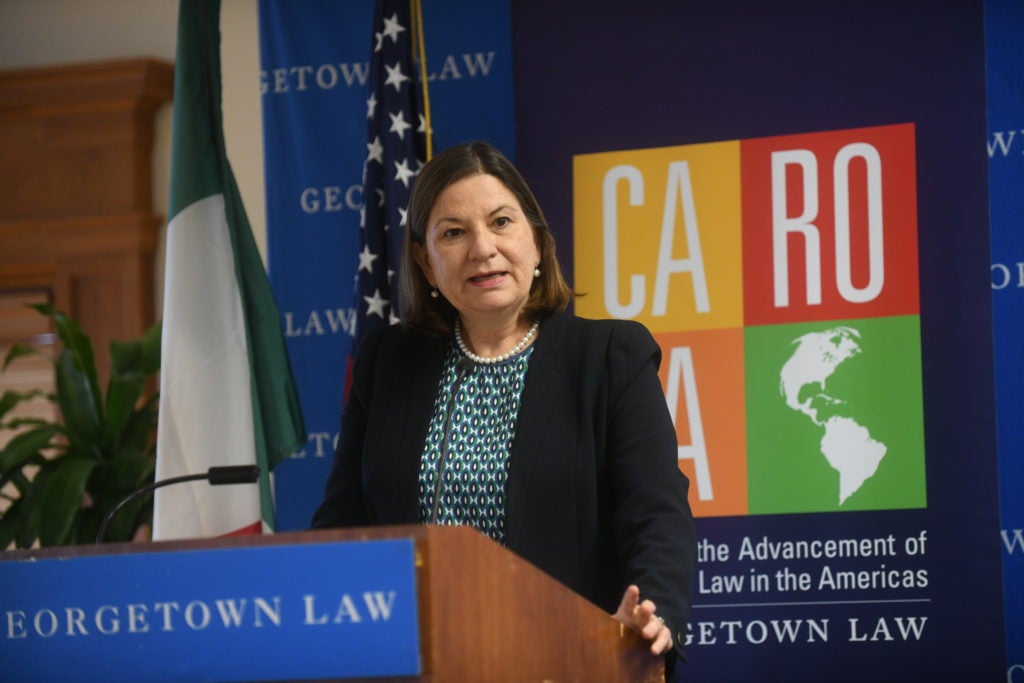 The conference concluded with a keynote speech delivered by Mexico’s Ambassador to the United States, Martha Bárcena. Ambassador Bárcena began her address with a note of optimism, offering the view that the USMCA would get through this year and putting forward a more nuanced perspective on the importance of the agreement not only for Mexico, but also for the United States. People in the U.S. often ignore the importance of Mexico to the United States. Mexico is the second export market for the U.S. and its third largest trading partner. “In the last two months,” Ambassador Bárcena added, “Mexico has been the number one trading partner of the United States.” Six million American jobs depend on trade with Mexico. To put things into perspective, “all the trade of India and Japan is less than the trade of Texas with Mexico,” Ambassador Bárcena continued. It is easy to get dragged into a narrative of what the problems between the countries in the North American region are, and it is key therefore, not to lose sight of what the challenges for continuing to build prosperity really are.
The conference concluded with a keynote speech delivered by Mexico’s Ambassador to the United States, Martha Bárcena. Ambassador Bárcena began her address with a note of optimism, offering the view that the USMCA would get through this year and putting forward a more nuanced perspective on the importance of the agreement not only for Mexico, but also for the United States. People in the U.S. often ignore the importance of Mexico to the United States. Mexico is the second export market for the U.S. and its third largest trading partner. “In the last two months,” Ambassador Bárcena added, “Mexico has been the number one trading partner of the United States.” Six million American jobs depend on trade with Mexico. To put things into perspective, “all the trade of India and Japan is less than the trade of Texas with Mexico,” Ambassador Bárcena continued. It is easy to get dragged into a narrative of what the problems between the countries in the North American region are, and it is key therefore, not to lose sight of what the challenges for continuing to build prosperity really are.
Her Excellency Bárcena also commented on the USMCA’s chapter on labor and the shared interest of the Democratic Party and the Mexican government in implementing the rights therein recognized. “A progressive and effective labor rights agenda is one of the top priorities of President Lopez Obrador,” Ambassador Bárcena remarked. The current Mexican government was going to pass a labor reform with or without the USMCA. Passing the labor reform now and aligning it with Annex 23A of the agreement not only shows that the Mexican President is convinced of labor reform, but also that the government will honor its commitments.
During Q&A, Ambassador Bárcena articulated a message that resonated with the audience: “The U.S. labor movement will never have a better ally than the one of the Mexican government right now.” Adding the phrase “seize the opportunity,” Ambassador Bárcena expressed support for the cause of improving workers’ rights in both Mexico and the United States, while also noting that labor obligations under the USMCA should be reciprocal.

